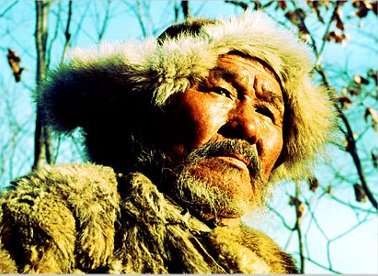Dersu Uzala

The title character.
Dersu Uzala is a nonfiction book written by Vladimir Arsenyev, a Russian officer sent on a series of exploration missions in the Siberian Far East at the turn of the 20th century. The book is named after an indigenous nomadic hunter whom Arsenyev befriended, and whose life was one of primal symbiosis with the harsh environment.
The book was made into a movie on two occasions, the second and more famous adaptation being that of Akira Kurosawa in 1975.
Tropes used in Dersu Uzala include:
- Anvilicious: While starting in the tone of a pamphlet to the glory of the Tsar and the Mighty Whitey Golden Age of Travel, it slowly fades to a critique of a heartless and selfish modern world that will destroy the deep and highly spiritual relationship of the natives with their environment.
- Badass Grandpa: You can tell from the picture above.
- Bamboo Technology: Save for his rifle, Dersu has no modern gear at all (and his rifle is described as being an antique he inherited from his father). With just a knife and what nature has to offer, however, he can craft pretty much anything he might need. Many times with actual bamboo, not uncommon in the taiga.
- Crazy Survivalist: At least once the Russians laughs of what they consider Dersu's excessive zeal on fire making or camping. Needless to say, he's always right, so the others soon learn to shut up and start digging/lumbering/actually doing something.
- Crowning Moment of Awesome: Dersu is full of these. Arseniev and his pals have some too.
- Crowning Moment of Heartwarming: Dersu is also full of these, as he seems to be a generous and (from an European point of view) a noble man unspoiled by civilization.
- Did Not Do the Research: Averted. The whole book is a great Shown Their Work moment of a very poorly known corner of the world at that time.
- The Empire: Russia.
- The Film of the Book: Two of them, one Russian and the other Japanese-Russian, made by Akira Kurosawa and a Crowning Moment of Awesome for the history of cinema.
- Going Native: The result of enduring several expeditions into the wild for Arseniev.
- Improbable Aiming Skills: The man mostly ate what he shot and got everything else for furs, all his life. This shows.
- The Lost Woods: The primeval forest of eastern Siberia.
- Magical Manchukuo Asian: Though actually of Nanai ascent, Dersu sometimes fits the role accordingly, seeing the interconnectedness of all things, living in complete harmony with the environment, performing some shamanic medicine and addressing to all living things as "men". By extension, he might fall in the Crying Indian trope as well. Usually for good reasons.
- Mighty Whitey: Averted. Arseniev repeatedly acknowledges how much he had learned from Dersu and how it would have been absolutely impossible to navigate or even survive through the taiga without his guide.
- My Country, Right or Wrong: In 1922, when the furthest reaches of Siberia were finally annexed to the Soviet Union, Arseniev chose to stay in Vladivostok and become a Soviet citizen, even if he was hardly a communist.
- My Master, Right or Wrong: Dersu generally is a loner, but he never risks having Too Many Cooks Spoil the Soup and will accept orders from the leader of the expedition even against his advice.
- Nature Hero: Dersu is the quintessential wild mountain man, more at ease in the deepest wilderness than anywhere civilized. As such, he saves the lives of Arsenyev and his men on two occasions.
- Odd Friendship: Between the young Russian officer and the grizzled native.
- Officer and a Gentleman: Arseniev, who was a quite literate man and also a hardened officer.
- Scenery Porn: Arseniev is quite good at describing the unspoiled beauty of the Siberian taiga. Kurosawa's movie takes it Up to Eleven and explodes with these, all of them Egregious.
- Snow Means Death: Or at least it would have been for Arseniev, if he didn't had Dersu at hand.
- Tear Jerker: If Dersu's end don't induce you to drip some Manly Tears, you may consider yourself emotionally dead to all effects.
- Tsarist Russia: though the Tsar is really, really far away.
This article is issued from Allthetropes. The text is licensed under Creative Commons - Attribution - Sharealike. Additional terms may apply for the media files.